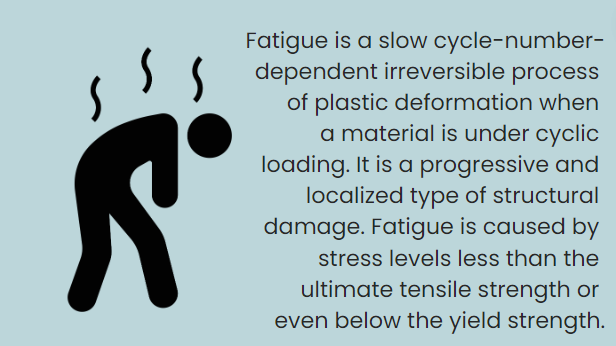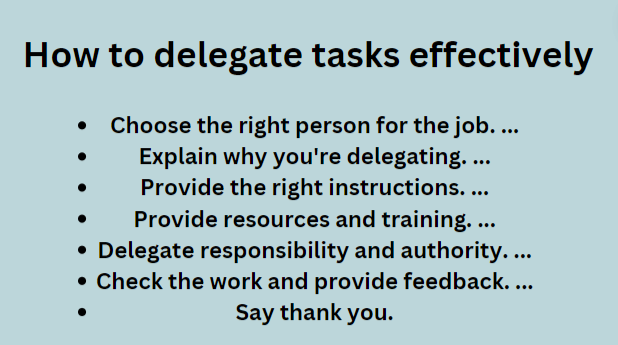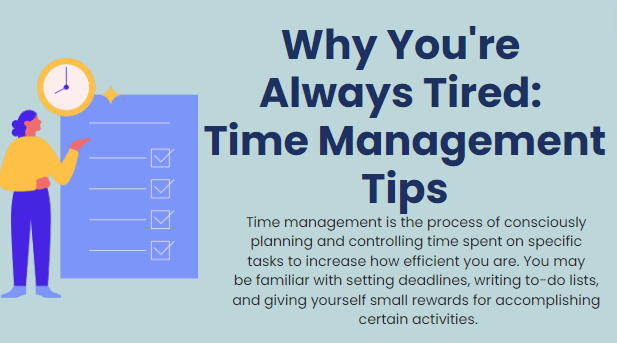Are you constantly feeling exhausted, no matter how much sleep you get? The culprit might be poor time management. In this article, we’ll explore the reasons behind chronic fatigue and provide practical time management tips to help you regain your energy and productivity.
Understanding the Fatigue Cycle
Before diving into time management strategies, it’s crucial to understand why you’re always tired. Common reasons include:
- Poor sleep habits
- Overwhelming workload
- Lack of prioritization
- Inefficient use of time
- Neglecting self-care
These factors often create a vicious cycle of fatigue, making it challenging to break free from constant exhaustion.

The Impact of Poor Time Management on Energy Levels
Poor time management can significantly affect your energy levels in various ways:
| Impact | Description |
|---|---|
| Stress | Constantly rushing to meet deadlines increases stress, leading to mental and physical fatigue. |
| Overwhelm | A never-ending to-do list can make you feel overwhelmed, draining your motivation and energy. |
| Lack of Rest | Inefficient use of time often results in working longer hours, leaving less time for rest and recovery. |
| Neglected Health | Poor time management can lead to skipping meals, exercise, and relaxation, all essential for maintaining energy levels. |
See also>> Balancing Work and Life: Tips for Success
Essential Time Management Tips
Now that we understand the connection between time management and fatigue, let’s explore some practical tips to help you regain control of your time and energy.
1. Prioritize Your Tasks
One of the most effective ways to manage your time is to prioritize your tasks. Use the Eisenhower Matrix to categorize your tasks based on urgency and importance:
| priority level | urgent | not urgent |
| important | do first | plan your schedule |
| not important | delegate | eliminate or limit |
2. Create a Realistic Schedule
Develop a daily or weekly schedule that accounts for all your activities, including work, personal time, and self-care. Be realistic about how long tasks take and include buffer time for unexpected events.
3. Use the Pomodoro Technique
The Pomodoro Technique is a time management method that can help improve focus and reduce fatigue. Here’s how it works:
- Choose a task
- Set a timer for 25 minutes
- Work on the task until the timer rings
- Take a 5-minute break
- Repeat steps 1-4 four times
- Take a longer break (15-30 minutes)
This technique helps maintain focus while ensuring regular breaks to prevent burnout.
4. Minimize Distractions
Identify and eliminate common distractions that hinder your productivity. Some strategies include:
- Turning off notifications on your phone and computer
- Using website blockers during work hours
- Creating a dedicated workspace
- Communicating boundaries with colleagues and family members
5. Learn to Say No
Overcommitting is a common cause of fatigue and poor time management. Learn to say no to non-essential tasks or commitments that don’t align with your priorities.

6. Delegate Tasks
Identify tasks that can be delegated to others, both at work and in your personal life. This frees up time for more important responsibilities and reduces your overall workload.
7. Use Time-Tracking Tools
Utilize time-tracking apps or software to gain insights into how you spend your time. This awareness can help you identify time-wasters and areas for improvement.
8. Practice Self-Care
Make time for activities that recharge your energy, such as:
- Regular exercise
- Meditation or mindfulness practices
- Hobbies and leisure activities
- Quality time with friends and family
9. Optimize Your Sleep Routine
Establish a consistent sleep schedule and create a relaxing bedtime routine to improve the quality of your sleep. Avoid screens before bed and create a comfortable sleep environment.
10. Take Regular Breaks
Incorporate short breaks throughout your day to prevent mental fatigue and maintain productivity. Use this time to stretch, walk, or practice deep breathing exercises.
See also>> Simple Time Management Tricks for Busy Students: Mastering Your Schedule
The Benefits of Effective Time Management
Implementing these time management strategies can lead to numerous benefits:
| Benefit | Description |
| Increased Energy | Better time management reduces stress and allows for proper rest, leading to higher energy levels. |
| Improved Productivity | By focusing on important tasks and minimizing distractions, you’ll accomplish more in less time. |
| Enhanced Work-Life Balance | Effective time management creates space for both work and personal activities, reducing burnout. |
| Reduced Stress | A well-organized schedule and prioritized tasks help alleviate the stress of constant deadlines and overwhelming workloads. |
| Better Sleep Quality | Proper time management allows for a consistent sleep schedule, improving overall sleep quality. |
See also>> The Best Ways to Prepare for Tests Without Stress
FAQs
Q: How long does it take to see results from improved time management?
A: While some benefits may be noticeable immediately, it typically takes 2-4 weeks of consistent practice to see significant improvements in energy levels and productivity.
Q: Can time management techniques help with procrastination?
A: Yes, many time management strategies, such as the Pomodoro Technique and task prioritization, can help combat procrastination by breaking tasks into manageable chunks and creating a sense of urgency.
Q: Is it possible to over-schedule yourself when trying to manage time better?
A: Yes, it’s important to maintain a balance and include buffer time in your schedule. Over-scheduling can lead to stress and burnout, defeating the purpose of time management.
Q: How can I stick to my time management plan?
A: Start small, be consistent, and adjust your plan as needed. Use reminders, accountability partners, or habit-tracking apps to stay on track.
Q: Can poor time management affect my physical health?
A: Yes, chronic poor time management can lead to stress, inadequate sleep, and neglect of healthy habits, which can negatively impact your physical health over time.
Conclusion
Chronic fatigue often stems from poor time management practices. By implementing the strategies outlined in this article, you can regain control of your time, boost your energy levels, and improve your overall quality of life. Remember that developing effective time management skills is a process that requires patience and consistency. Start with small changes and gradually incorporate more techniques as you build new habits.
